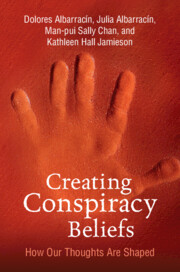Members of the public can disagree with scientists in at least two ways: people can reject well-established scientific theories and they can believe fabricated, deceptive claims about science to be true. Scholars examining the reasons for these disagreements find that some individuals are more likely than others to diverge from scientists because of individual factors such as their science literacy, political ideology, and religiosity. This study builds on this literature by examining the role of conspiracy mentality in these two phenomena. Participants were recruited from a national online panel (N = 513) and in person from the first annual Flat Earth International Conference (N = 21). We found that conspiracy mentality and science literacy both play important roles in believing viral and deceptive claims about science, but evidence for the importance of conspiracy mentality in the rejection of science is much more mixed.


